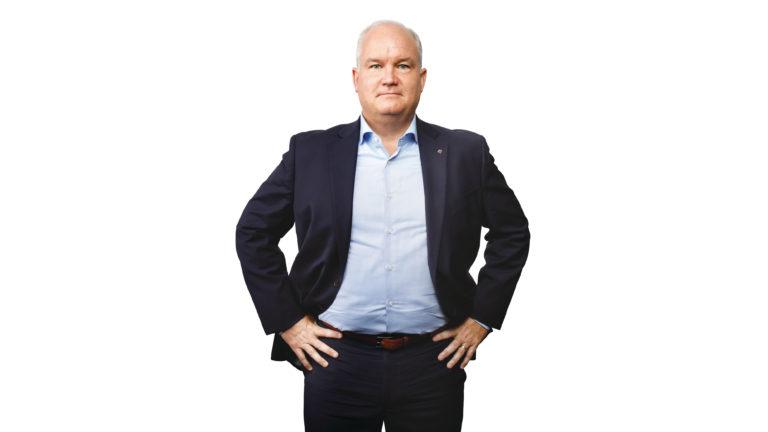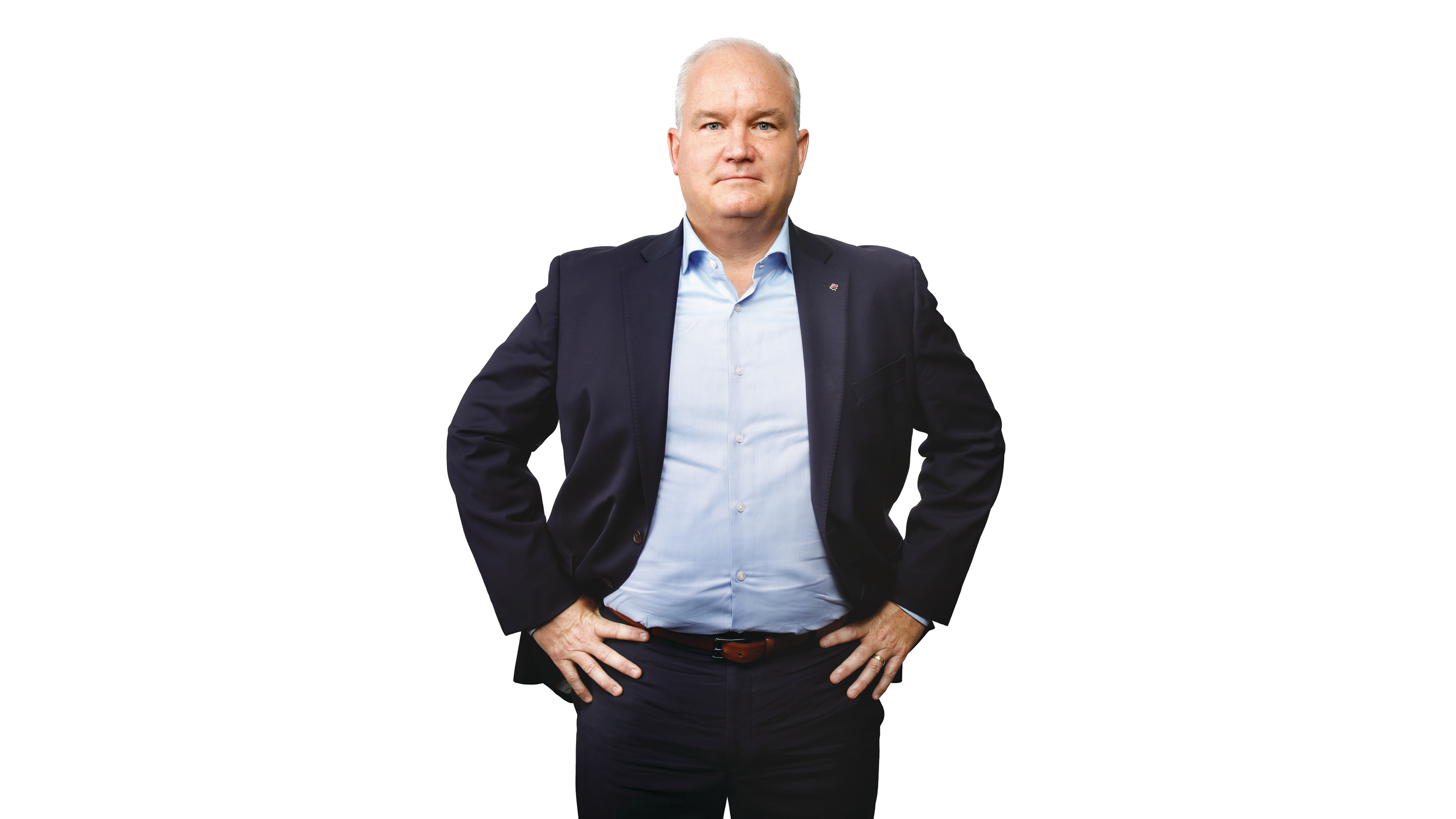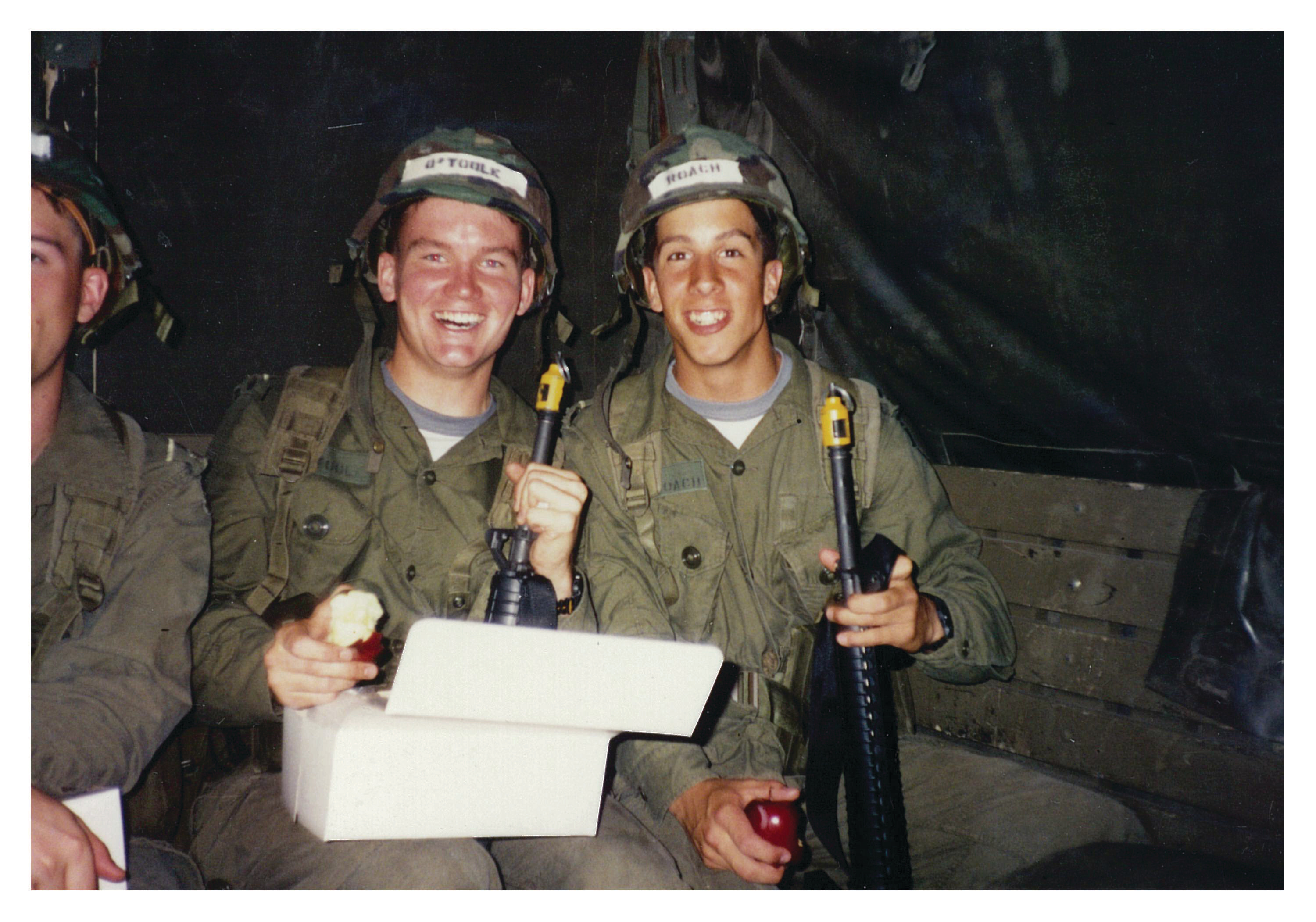Who really is Erin O’Toole?
The Ontario MP is back for another attempt to become leader of the Conservative Party, dropping the all-smiles routine for an angrier tone. But will drawing from the Andrew Scheer playbook pay off?

O’Toole is vying to be the party’s Top Gun (Photograph by Blair Gable)
Share

Picture a young Tom Cruise in aviator sunglasses, his hair barely displaced by the breeze on the tarmac. He trades the shades for a helmet and swaggers over to a jet. He’s about to save the day and look good doing it.
You’re a 13-year-old boy when Top Gun comes out in 1986. A few years later, still a teenager, you walk into a recruitment centre and apply to be a fighter pilot. You make it to air crew selection. It’s three intensive days of tests and simulations. Now, here it comes: the moment you’ve been waiting for. You’ve been selected . . . as a navigator. “I walked into the recruiting centre thinking I was going to be Maverick. And not only was I not Maverick, I was Goose. And I was on an old, antiquated helicopter,” says Erin O’Toole. But, hey: “You learn more from your setbacks than from your successes,” he likes to say now.
O’Toole never tried again to become a pilot. After coming up short on the Conservative Party of Canada’s leadership contest in 2017, however, the Ontario MP is making another attempt. And he says he’s learned plenty. The cuddly, moderate candidate of a few years ago is now a more aggressive “true blue” character with a bone to pick. He still isn’t well-known by the broader public. And this second run has been characterized more by a rivalry with Peter MacKay and contortionist flirtations with social conservatives than by the detailed policies he is proposing.
In the bigger picture, pandemic shutdowns, civil unrest and increasingly polarized social media have made for a challenging national backdrop in 2020, even as deep-rooted disagreements roil inside the party’s ranks. Can O’Toole unite his own party, let alone the country? To answer that question, one has to get to the bottom of another one: Who really is Erin O’Toole?
[contextly_auto_sidebar]
O’Toole spent most of his childhood in Bowmanville, Ont., and some in Port Perry not far away. His parents moved to the area from Montreal when he was one, so his father could take a promotion at the GM headquarters in Oshawa. (“I didn’t master the French language by the time I left,” he jokes. His language ability now is reasonably good, though lacking the easy fluency many Quebecers would prefer in a prime minister.)
When O’Toole was nine years old, his mother died of breast cancer. His father eventually remarried and Erin was the oldest of their combined five kids. Before she passed away, his mother, who had worked with Vietnamese refugees, instilled a sense of service in him, O’Toole says. Although there wasn’t much talk of the military at home, he learned both his grandfathers had served in the Second World War. Drawn in by a feeling of patriotism, and “struck” by the beauty of the Royal Military College campus, he followed through on his dream to attend RMC.
In 1995, during his first posting in Trenton, O’Toole took his leave to volunteer on his father’s campaign in the Ontario election. John O’Toole would serve as Durham’s MPP for 19 years. From his next posting in Winnipeg, Erin enjoyed coming home to hear political war stories. It planted a seed. “I did like the partisan cut-and-thrust, but I also loved that you could really make a difference,” he says.
He finished his active military service in 2000, joining the reserve and attending law school at Dalhousie University. Eventually, he and his wife, Rebecca, who he met during his final military posting in Nova Scotia, moved to Ontario. O’Toole worked for two law firms on Bay Street. Rebecca, they both admit, had the “fun jobs,” working for Hockey Canada, the Toronto Argonauts and the Olympic broadcasting consortium. After the Bay Street gigs, O’Toole took a job as a corporate lawyer at Procter & Gamble. During the same period, he founded a veterans’ charity, True Patriot Love. Politics was always on the horizon. His youngest of two kids was just a year old when, in 2012, Bev Oda stepped down as Durham’s MP. Within a week, the family had its ducks in a row so O’Toole could run in the by-election. He won.
O’Toole was soon appointed by Stephen Harper as parliamentary secretary to the minister of trade, Ed Fast. He was promoted to veterans affairs minister in January 2015, taking over from disaster-prone Julian Fantino nine months before the election that gave Justin Trudeau’s Liberals a majority. Jason Kenney, now the premier of Alberta and O’Toole’s biggest-name endorser, took over the defence file at around the same time. He makes no bones about the fact their government had “a series of real problems” managing Veterans Affairs. “Stephen appointed Erin because he knew he was a hyper-competent guy,” Kenney says.
“It seemed to me, when he was brought in, he was brought in more for his skills as a lawyer and to take [Veterans Affairs] out of the equation in an election,” says Mike Blais, founder of Canadian Veterans Advocacy. His lasting distaste for Harper’s austerity-era budget cuts are obvious. But he reserves a special ire for O’Toole, who seemed to glean no sympathy from having been a veteran himself. “I don’t think it’s fair to say, ‘Oh, gee, he inherited a mess, he did his best.’ I don’t think so. I think he inherited a mess and the mess got worse.”
When the Harper government fell, O’Toole put his hat in to become interim leader, not gaining much traction. Then, in October 2016, he joined the permanent leadership contest. Andrew Scheer beat him to it by several weeks. Their campaigns’ strategies, policies and tone were so similar it’s “maddening” to look back on, says a campaign staffer. Both offered non-controversial ideas and appealed to party unity. With Scheer successfully targeting down-ballot support from a large contingent of social conservatives, and Maxime Bernier attracting the party’s libertarians, O’Toole tried to be the progressive conservative candidate. He finished third.
O’Toole was considered a fantastic team player. “He sucked it up and he joined the team, and he was helpful, he was reasonable and he was very good to work with,” says Brock Harrison, a former director of communications for Scheer. “Really, that’s all you can ask for from a guy who put himself out there and lost.” There was nonetheless a sense that O’Toole, honing his skills as an outspoken critic on foreign affairs, was just waiting for another opportunity. As one Conservative source describes it, O’Toole is super-smart and super-ambitious. If he has to climb over people, he will, the source says. It’s like that scene in the 2008 Batman film The Dark Knight, when the Joker is choosing acolytes. The villainous madman says, “We’re having tryouts, and there’s only room for one.” He breaks a pool cue, casting one sharp-ended half on the ground and leaving prospective associates to duke it out. “Erin is the guy reaching for the stick,” the source says.
RELATED: ‘I don’t hide who I am’: Leslyn Lewis’s pitch to conservative voters
“There’s obviously been some internal division and discord over Andrew [Scheer]’s leadership, which I think is very regrettable and was uncalled for,” says Kenney. “The critical thing is that Erin—whoever wins—must move quickly to unite the party, reaching out to all different currents of opinion.” That includes a renewed focus on immigrant communities, especially in the Greater Toronto Area, which Kenney considers an “electoral linchpin.” As a selling point, O’Toole’s campaign is quick to emphasize his strength in the suburbs—leaning on the fact that he has held a seat in the GTA even while Conservatives bled support in the area during the last two elections.
Arundeep Singh Sandhu, an organizer for O’Toole north of Calgary, tires of the regurgitation of issues that have been resolved in Canadian law. For example, to the vast majority of his peers, Sandhu says, gay marriage is just marriage. Time to move on. Natalie Pon feels the same way. She helped spearhead the removal of the Conservative Party’s traditional definition of marriage in 2016. At the time, O’Toole went out of his way to congratulate her. “He got my information and said, ‘Hey, I’m so proud of you for what you did,’ ” she recalls.
Although O’Toole acknowledges climate change is a real problem and proposes market measures to lower emissions, he would eliminate the carbon tax and, like any Conservative politician seeking support from Alberta, will bend himself into pretzels for the oil and gas sector. What appeared to be a foray into ideas outside the Conservative norm—a pledge to end “fossil fuel subsidies”—lasted in O’Toole’s policy book for exactly a day. Pon believes he will be open to debate on different points of view as leader—including on environmental issues and on social conservatism.
O’Toole’s newfound sympathy for social conservatism is pure “opportunism,” Quebec MP Joël Godin recently told Le Devoir. Former Conservative minister Ed Fast says, “It’s somewhat disingenuous for Erin to now claim that he’s ‘true blue Tory’ and that Peter [MacKay] is ‘Liberal lite.’ There’s virtually no daylight between the two. Erin is doing what he needs to do to try to win the leadership.” Godin and Fast are two of about a dozen MPs who supported O’Toole in 2017 but are backing MacKay in 2020.
O’Toole acknowledges that seeming “too moderate” on social issues was a reason for his loss to Scheer, and that courting down-ballot support from social conservatives, like Scheer did in 2017, is a strategy on his campaign. Reacting to the Conservatives’ election loss in October, MacKay called social conservatives’ issues a “stinking albatross” around Scheer’s neck.
O’Toole is pro-choice, says he will march in Pride parades and voted in favour of a 2013 transgender rights bill (something MacKay has attacked). He says he respects differences of opinion, though. “As a liberty-minded conservative, I also defend religious freedom and conscience rights and I can show that I’ll defend that just as strongly as I try to defend women’s rights and LGBT rights,” he says.
No overtly socially conservative policies made their way into O’Toole’s 50-page policy book, which features a robust, if often predictable, roster of ideas on the energy sector, gun ownership, tax reform and defunding the CBC. He promises to eventually balance the budget. There is more-controversial fare: O’Toole supports using the notwithstanding clause to enforce mandatory minimum sentences, for example, and making it a criminal offence to block transportation infrastructure. (Remember the pre-pandemic national crisis that saw rail lines blocked by protesters, many of them Indigenous?) For his hard line on that issue, paired with his “Take Canada Back” slogan, he has been accused of engaging in dog-whistle politics. His campaign dismisses that as pure politics.
O’Toole has more recently been criticized for failing to define “systemic racism” during a leadership debate, although he elaborates to Maclean’s that while he disagrees with defunding police forces, Ottawa should “make sure from top to bottom that there are no inherent areas of bias,” including, specifically, anti-Black discrimination.

Even as friends and colleagues call him a measured, thoughtful person, O’Toole’s tone, particularly on social media, has been noticeably more bombastic. During the last leadership race, his Twitter feed was all smiles and thanks to people he’d met campaigning. This year, a majority of posts put him on the offensive. Trudeau is characterized as “corrupt,” “weak” and “an international embarrassment.” Peter MacKay is characterized as an untrustworthy flip-flopper.
Asked why he seems . . . angrier now, O’Toole says, “I kind of get a kick out of that comment. Because I’m the same person. But I’m certainly more worried about my country than I was three years ago.” Campaign manager Fred DeLorey explains it this way: “When he ran last time, it was only several months under a Justin Trudeau government. Now it’s been five years.” His tone, DeLorey says, serves to match that of an increasingly frustrated base.
And, at least online, they are responding to O’Toole’s efforts. He considerably outpaces MacKay on social media engagement. Jeff Ballingall, who runs his digital campaign, has a lot to do with that. Ballingall co-founded a nonprofit group, Conservative Victory, that lobbied for Scheer’s ouster after October’s federal election. He decided to support O’Toole after talking to a range of prospective candidates. The fact that Ballingall founded the popular Ontario Proud and Canada Proud Facebook pages—backed by considerable corporate funding—and is chief marketing officer for a right-leaning website, The Post Millennial, has caused some to raise their eyebrows at how he may leverage those assets in favour of his preferred candidate. MacKay’s team threatened a lawsuit in late April over pro-O’Toole coverage on the above platforms without mention of Ballingall’s affiliations. Ballingall disagrees that anything inappropriate happened. “I think there’s a lot of people that realize they’re not doing a very good job on digital. It just speaks of desperation.”
O’Toole’s camp tried to make legal trouble for his opponent, too. In mid-June, an allegation that outside actors stole O’Toole campaign data for MacKay led to a police investigation and the firing of an MP’s student employee. MacKay’s campaign denies being involved. For some conservatives, the public accusation was in poor taste. It is difficult to quantify how online attention will translate into support on paper mail-in ballots, which must be received by Aug. 21.
Borrowing from the playbook that won Scheer his leadership last time also means accepting the risk that O’Toole would face similar challenges at the helm, including a perception, no matter how unfair, that he has been co-opted by some of the darker forces within his own party. But if the strategy pays off, it will be because he learned more from his setbacks than his successes, as O’Toole likes to say. A sequel to Top Gun is scheduled for release in 2020, which he admits he’s excited about. Maybe he gets to be Maverick after all.
This article appears in print in the August 2020 issue of Maclean’s magazine with the headline, “Into the danger zone.” Subscribe to the monthly print magazine here.